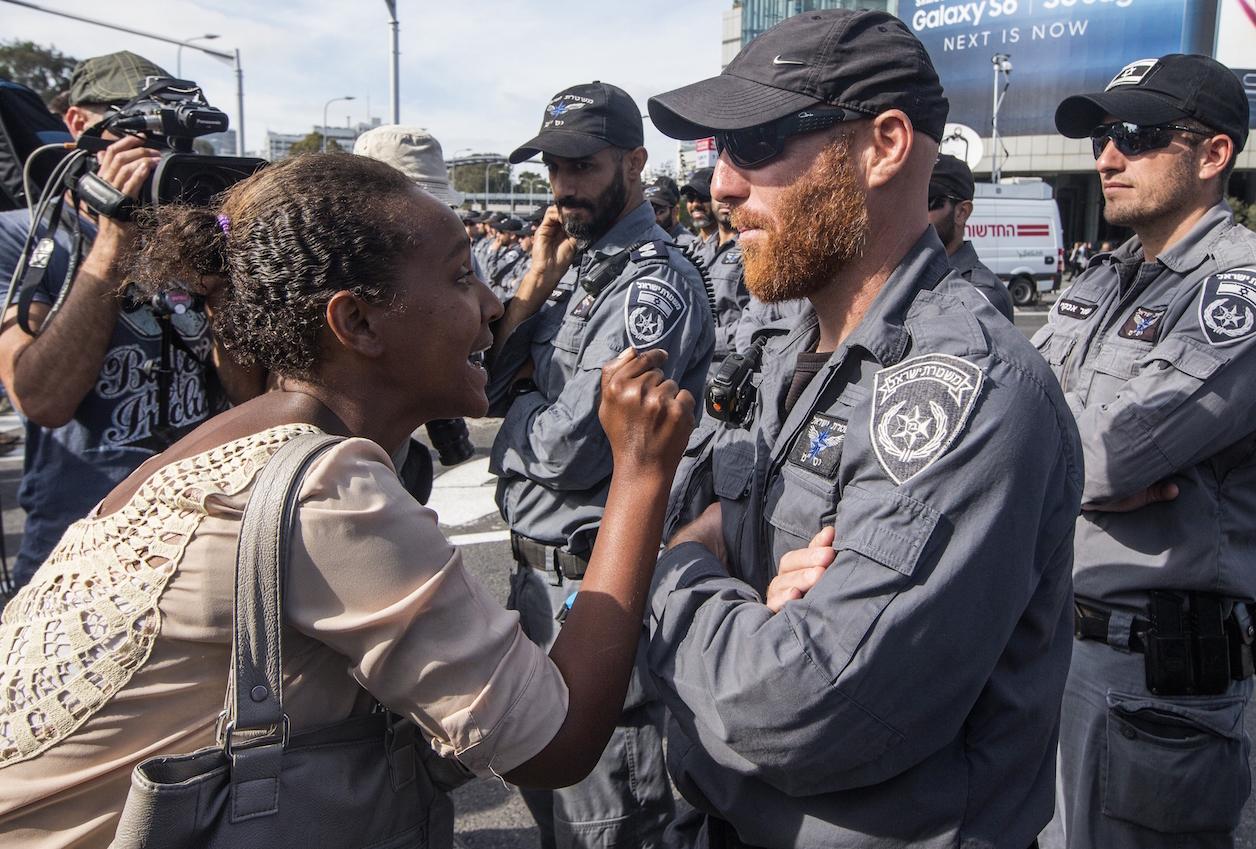Ethiopian Israelis have had enough of the state’s institutional racism
An Israeli woman from the Ethiopian community argues with Israeli security forces on May 03, 2015, during a protest in Tel Aviv against alleged police brutality and institutionalized discrimination.
TEL AVIV, Israel — The chaos at Sunday’s protest against police brutality shocked many residents of Tel Aviv, normally a calm and isolated bubble. Ask members of Israel’s Ethiopian minority, though, and they’ll tell you it was decades in the making.
Thousands of Israelis, mostly of Ethiopian descent, blocked the Ayalon, the city’s main urban highway, for several hours during the afternoon rush. Around sunset they moved on to city hall, where a phalanx of police officers was deployed. Some of the demonstrators started throwing bottles, and police responded with tear gas and stun grenades.
Scores of people were injured in the melee, including police officers, and dozens of protesters were arrested. It was the second chaotic protest in less than a week, after a similar demonstration in Jerusalem on Thursday.
The proximate cause for all of this was a two-minute video that showed a uniformed Israeli soldier, Damas Pakada, standing with his bicycle on a street on Holon, south of Tel Aviv. A police officer approached and, seemingly without any provocation, began shoving and punching Pakada. Several others joined the fray and detained Pakada for alleged assault.
Pakada arrived from Ethiopia seven years ago, one of about 130,000 Ethiopian Jews who live here, roughly two percent of the population. While there are no hard statistics, the community has long complained of brutal treatment at the hands of police; a local activist group says that nearly one-third of the minors in Israeli prisons are of Ethiopian descent.
“There’s been police violence against the Ethiopian community for many years, but it’s been very, very difficult to prove,” said Fentahun Assefa-Dawit, the director of Tebeka, an NGO that advocates on behalf of Ethiopian Israelis. “What’s different this time is the footage.”
Most Ethiopian Jews arrived in two major waves of immigration in the 1980s and early 1990s, during the long civil war in their native country. The government forbade Jews from emigrating, so the Israeli army and intelligence services smuggled them out on a series of clandestine flights.
Israel encouraged the migration, having spent years organizing the flights, but the new arrivals still faced discrimination. They were initially housed in trailer homes, and forced to undergo a humiliating experience after landing: When the first big wave arrived in the mid-1980s, the chief rabbis required them to take a symbolic "mikvah," a ritual bath.
They were the only immigrating Jews forced to do so, and hundreds of them marched on the airport in protest, threatening to leave the country. The rabbinate argued that, after centuries of isolation from other Jews, the Ethiopians should “renew their Judaism.” It eventually relented and dropped the requirement. But the community remains angry about the practice to this day.
“Every white person who wants to immigrate is welcome. Every Ethiopian person, regardless of how they practiced Judaism, has been suspect,” said Shula Mola, the chair of the Israeli Association for Ethiopian Jews. “I can’t explain it any other way. It’s about their color.”
Racism in Israel is not limited to Ethiopians, of course: Indeed, some of the weekend’s protesters chanted slogans like, “We aren’t Arabs!”
Ahmad Tibi, a Palestinian member of the Knesset, Israel’s parliament, argued that Israeli police were relatively restrained with Ethiopian protesters, compared to how they deal with protests by the Arab minority. “Every Arab wishes to be Ethiopian for a few hours,” he said.
But Many Ethiopians in Israel, though they’ve been residents for decades, continue to live in grim conditions. Just half of Ethiopian high school students passed their matriculation exams in 2013, compared to 63 percent of the general population, according to Israel’s Central Bureau of Statistics. The Israeli Association’s Mola said many Ethiopian teenagers are pushed into vocational programs instead of college. Salaries for Ethiopian families are one-third lower than the national average.
“It’s not just a [problem] between the police and the Ethiopian community,” said Assefa-Dawit. “When an Ethiopian applies for a job, as impressive as his CV might be, he’s not going to be invited for an interview because he has an Ethiopian name.”
Still, the recent protests prompted promises of action from the Israeli government: The video, and the resulting violence, made the subject impossible to ignore. Two officers were suspended after the video aired on local media, and Pakada was released. Netanyahu met with him on Monday. “I was shocked by the pictures that I saw. We cannot accept this, and the police are dealing with it,” Netanyahu told him. “We love the Ethiopian community, and all Israelis are in this together.”
Netanyahu promised to draft a “comprehensive plan” to address the economic and social problems in the Ethopian community. After decades of inaction, though, Mola said she was skeptical that anything would change.
“We don’t want love, we want action,” she said. “They think that, because we came from Africa, it’s enough to have a poor neighborhood, to work as cleaners or mechanics, to have a tiny apartment. We want opportunities to be normal citizens.”
Every day, reporters and producers at The World are hard at work bringing you human-centered news from across the globe. But we can’t do it without you. We need your support to ensure we can continue this work for another year.
Make a gift today, and you’ll help us unlock a matching gift of $67,000!
